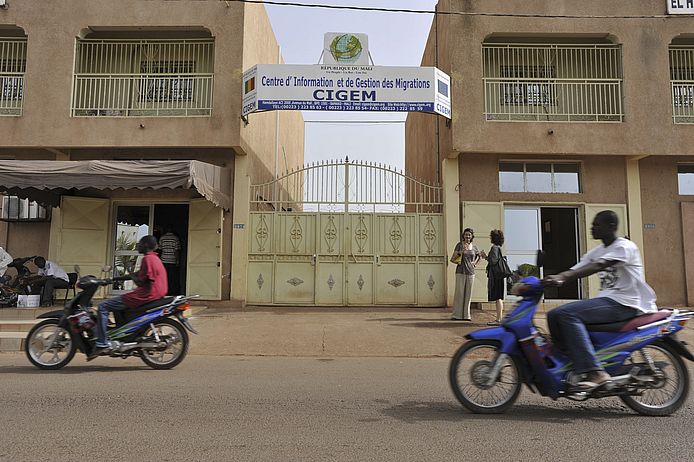The Corona crisis is currently the center of attention. At the same time, however, other crises persist and are sometimes exacerbated by the pandemic and measures to contain it. Refugees and migrants are witnesses and indicators of these crises. For a few weeks, media attention focused on some 12,000 of them living in squalor on Lesvos. The situation on the Greek islands remains desolate and must not be forgotten, but so do other regions where people are stranded in search of protection and participation.
More and more often, their hopeless situation is the result of agreements between the European Union on the one hand and the countries of origin or transit on the other. The new European asylum and migration package presented by the EU Commission at the end of September will not change this.
The EU-Turkey agreement, which provides for payments in the billions of euros so that Turkey will prevent refugees from continuing their journey to Europe, while at the same time detaining those on the Greek islands who nevertheless enter irregularly, is not the first barter deal at the expense of people on the run - and will not be the last. Since as early as mid-2006, the Rabat Process has brought together European governments and governments from North, West and Central Africa to coordinate on "migration management" issues.
The Khartoum Process, launched in 2014, is about cooperation between the EU and countries of origin and transit in North and East Africa to slow down flight and migration movements across the Horn of Africa toward Europe, while not shying away from cooperation with dictatorships such as in Eritrea or Sudan. The consequences for human rights and democratization processes are devastating and cannot be reconciled with the claim of the German government and the EU that they want to reduce the causes of flight in the countries of origin.
In its new asylum and migration pact announced at the end of September, the EU Commission nevertheless sticks to this strategy. Contrary to the claim that the new pact is an expression of a "paradigm shift" in cooperation with countries of origin and transit, the announced plans are in several respects congruent with what was already set in motion years ago: increased cooperation with third countries in promoting return and reintegration, in combating "people smuggling" and so-called irregular migration - as well as in creating legal migration opportunities.
If one looks at the West African country of Mali, where the EU already opened its first migration center (CIGEM) in 2008 for precisely these purposes, one can see how little importance is likely to be attached to the last point. While there, too, there was talk at the beginning of creating legal migration opportunities, it was soon said that there were no plans to help migrants find jobs in Europe. In 2014, the center was closed again, but the number of people displaced in Mali - whether because of war and violence or because the climate crisis and the theft of raw materials are depriving them of their livelihoods - is increasing. Seven years of European military intervention with German participation have done nothing to change this. On the contrary. The number of armed groups and affected regions has multiplied, as has the number of displaced people, most of whom are seeking refuge within the country or in neighboring countries.
The lives of the people in the Sahel are marked by multiple insecurities. The massive presence of international troops is not helping to change this situation - and is causing the population to doubt the purpose of the mission. The suspicion is that it is clearly less about the security of the people on the ground than about protecting Europe from terror and unwanted refugees. However, the strategy of stabilizing a status quo that serves its own interests but is otherwise questionable, which Europe has pursued until now, failed at the latest in mid-August with the military coup against former President Keita. The push was preceded by months of mass protests over allegations of corruption, the poor economic situation and the inadequate education and health systems in Mali, which Europe ignored for far too long.
In Sudan, too, mass protests toppled a ruler who had guaranteed the EU stability on issues of migration management and prevention. In doing so, it overlooked the fact that long-time strongman Omar al-Bashir had an arrest warrant from the International Criminal Court for serious crimes in Darfur. Within the framework of the Khartoum Process and financed by the EU Emergency Trust Fund for Africa, the German Society for International Cooperation (GIZ) is implementing the Better Migration Management (BMM) program in Sudan and other countries in the Horn of Africa.
‘Sudan Uprising Germany’, an organization of exiled Sudanese supporting the democracy movement in the country from Germany, criticizes: "EU policies, led by Germany, have been a key factor in violating the rights of refugees, migrants in the Horn of Africa since 2015." Their recently launched #EndJanjaweed campaign draws attention to the EU's complicity with the Janjaweed militias, which were deployed by the al-Bashir regime and committed serious war crimes in Darfur and other regions. Renamed Rapid Support Forces (RSF), they are now not only cracking down on refugees on the border with Libya, but are also blamed for the violent crackdown on the democracy movement in July 2019.
If Germany and the EU are serious about mitigating the causes of flight, they must support the democratic forces in countries of origin like Mali and Sudan, not those who oppress them. And if protesters are left with only the path to exile, the borders must not be closed. Any deals aimed at preventing flight and migration to Europe at all costs and facilitating deportations to war and crisis regions are not justifiable in human rights terms.
The article first appeared on Der Hauptstadtbrief on October 31, 2020

